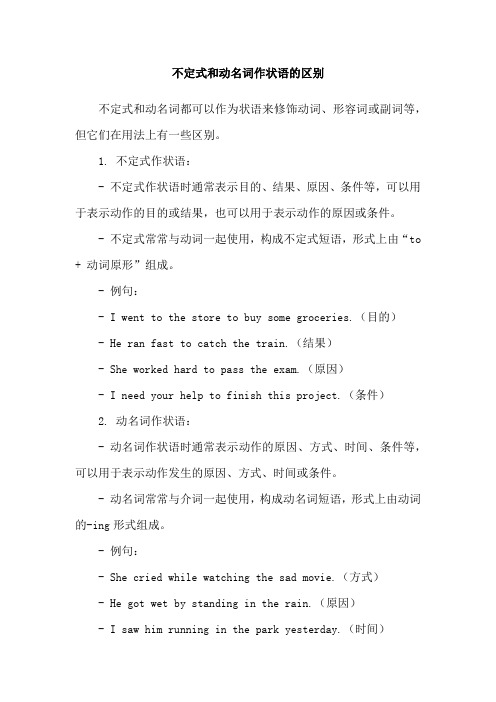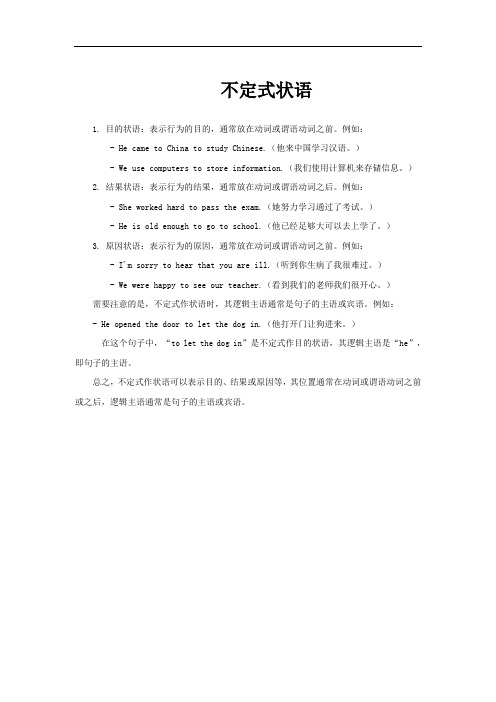不定式作状语
不定式和动名词作状语的区别

不定式和动名词作状语的区别
不定式和动名词都可以作为状语来修饰动词、形容词或副词等,但它们在用法上有一些区别。
1. 不定式作状语:
- 不定式作状语时通常表示目的、结果、原因、条件等,可以用于表示动作的目的或结果,也可以用于表示动作的原因或条件。
- 不定式常常与动词一起使用,构成不定式短语,形式上由“to + 动词原形”组成。
- 例句:
- I went to the store to buy some groceries.(目的)
- He ran fast to catch the train.(结果)
- She worked hard to pass the exam.(原因)
- I need your help to finish this project.(条件)
2. 动名词作状语:
- 动名词作状语时通常表示动作的原因、方式、时间、条件等,可以用于表示动作发生的原因、方式、时间或条件。
- 动名词常常与介词一起使用,构成动名词短语,形式上由动词的-ing形式组成。
- 例句:
- She cried while watching the sad movie.(方式)
- He got wet by standing in the rain.(原因)
- I saw him running in the park yesterday.(时间)
- They felt happy after finishing the project.(条件)总的来说,不定式更侧重于表示动作的目的、结果、原因或条件,而动名词更侧重于表示动作的原因、方式、时间或条件。
语法不定式做状语

4. 不定式还可以作结果状语或原因状语: 结果状语:
1. He was so late as to miss half of the lecture.
2. She is such a good student as to be
respected by all her classmates.
3. The house is large enough to hold 2000
so + many / few +名词复数 + that
1) She has so few friends that she often feels lonely.
2) There were so many people at the station that I didn’t recognize her.
1.He hurried to his house, only to find it had been broken into.
2.Her parents died, leaving her an orphan.
3.There was a tornado yesterday, causing 100 deaths.
early in the morning .
5.不定式有时需要用被动形式、完成形式 或进行时。
1.She was sent to England so as to be educated.
2.She left home, never to be seen again. 3.He was shamed to be seen doing this
Module Two
Grammar
——动词 to 不定式作状语
不定式状语

The man has to do some part-time jobs in his spare time so as to support his family .
那人为了养家不得不在业余时间做些另活。
You should study even harder in order to be a top student .要当尖子学生,你应更加努力学习。
A)常见的用“带to的不定式作宾语补足语”的及物动词有:
advise (劝告) , ask (请、要) , allow(允许、让) , beg(请求) , cause (使) , command (命令) , compel
(强迫) , encourage (鼓励) , expect (预料) , force (迫使) get (让) , hate (不喜欢) , help (帮助) , invite (邀请) , intend (想要) , instruct (指令) , leave (留给) , like (喜欢) , oblige (迫使) , order (命令) , permit (允许) , persuade (劝说) , prefer (宁愿) , press (强求) , remind (提醒) , request (要求) , urge (催促) , warn (警告) , want (想要) , wish (希望)
他申请给他一个去美国工作的机会。
These books are not allowed to be taken out.
这些书不得拿出去。
You are invited to banquet to be given at the embassy .
高中英语不定式作状语

不定式作状语,表意外或不幸的结果1. He tried many times to sneak across the border to a neighbouring country, only to be caught each time. 有很多次他都想从边境溜到邻国去,结果每次都被抓住。
2. To get quick profits from the trees, they have cut them down in large numbers, only to find that they have lost their good friends. 为了眼前的利益他们大量地伐树,结果发现他们失去了好朋友。
3. One time I came home to find a note on the front door that led me to another note , then another, until I reached the walk-in closet. 有一次,我到家时看到前门上有个条子,根据条子我找到了另一个条子,然后又找到一个,最后,我来到了可以走进去的壁橱跟前。
4. George returned after the war, only to be told that his wife had left him. 战后乔治回来了,结果有人告诉他,他的妻子已经离开了他。
5. He went to the seaside only to be drowned. 他去海边游泳,不幸被淹死了。
6. At last he managed to lift one of the boxes but only to drop it with a thud. 他终于搬起了一只箱子,不料砰的一声却掉在地上。
7. He survived the crash only to die in the desert. 他在飞机坠毁事件中幸存了下来,结果却死在沙漠里。
不定式作状语的例句

不定式作状语的例句1. 不定式作目的状语,哎呀,就像你为了吃那块美味的蛋糕,专门跑去蛋糕店一样,“He came here to see me.”他来这儿就是为了看我呀!2. 不定式作结果状语,哇塞,就好比你努力复习后终于考了个好成绩,“He woke up late only to find the bus had left.”他起晚了,结果却发现公交车已经开走啦!3. 不定式作原因状语,嘿,这就像你因为喜欢她所以总是想见到她呀,“She was happy to hear the good news.”她听到这个好消息很高兴呢!4. 不定式作条件状语,可不就像如果你努力锻炼就能变得强壮一样嘛,“To succeed, you must work hard.”要成功,你就得努力工作呀!5. 不定式作让步状语,哎呀呀,就像尽管困难重重,你还是坚持下去一样,“He went to work不定式作让步状语,哎呀呀,就像尽管困难重重,你还是坚持下去一样,“He went to work despite being tired.”尽管很累,他还是去上班了呢!6. 不定式作程度状语,哇哦,就好像他极其努力地工作,“He worked so hard to achieve his goal.”他为了实现目标那么努力地工作呀!7. 不定式作目的状语,这就如同你为了减肥而每天跑步,“I studyhard to get good grades.”我努力学习就是为了取得好成绩嘛!8. 不定式作结果状语,好比你跑太快不小心摔倒了,“He ran fast only to tri p over.”他跑得太快结果绊倒了呀!9. 不定式作原因状语,不就像你因为兴奋所以睡不着觉嘛,“He was excited to stay up late.”他因为兴奋所以熬夜了呀!10. 不定式作目的状语,就像你为了看日出而早起,“She got up early to watch the sunrise.”她早起就是为了看日出呢!我觉得啊,不定式作状语真的很有趣很实用呢,能让我们的表达更加丰富多样呀!。
不定式状语

不定式状语
1. 目的状语:表示行为的目的,通常放在动词或谓语动词之前。
例如:
- He came to China to study Chinese.(他来中国学习汉语。
)
- We use computers to store information.(我们使用计算机来存储信息。
)
2. 结果状语:表示行为的结果,通常放在动词或谓语动词之后。
例如:
- She worked hard to pass the exam.(她努力学习通过了考试。
)
- He is old enough to go to school.(他已经足够大可以去上学了。
)
3. 原因状语:表示行为的原因,通常放在动词或谓语动词之前。
例如:
- I'm sorry to hear that you are ill.(听到你生病了我很难过。
)
- We were happy to see our teacher.(看到我们的老师我们很开心。
)
需要注意的是,不定式作状语时,其逻辑主语通常是句子的主语或宾语。
例如:
- He opened the door to let the dog in.(他打开门让狗进来。
)
在这个句子中,“to let the dog in”是不定式作目的状语,其逻辑主语是“he”,即句子的主语。
总之,不定式作状语可以表示目的、结果或原因等,其位置通常在动词或谓语动词之前或之后,逻辑主语通常是句子的主语或宾语。
语法-不定式做状语

不定式的分类
要点一
带to的不定式通常出现在句子的 谓语、宾语、表语等位置,…
I want to go to the park.(我想去公园。)
要点二
不带to的不定式通常出现在句子 的状语位置,例如
I come here to see you.(我来这里看你。)
02
不定式做状语的形式和功能
不定式做目的状语
表现
在句子中,不定式的逻辑主语与句子 的主语不一致,导致句子的主谓关系 混乱。
示例
例如,在句子“She is happy to see you win the game”中,“you”是 句子的主语,“She”不是“to see” 的逻辑主语,因此是不定式的错误使 用。
05
练习与巩固
填空练习
1. ____________ (被期望) to finish the project ahead of time, we worked day and night.
01
例如
他早起是为了赶火车。
02
例如
他们决定住在这家酒店以便更好地游览城市。
不定式做结果状语
例如
他努力工作,结果却遭到了解雇。
例如
由于疏忽,他未能完成作业。
不定式做条件状语
例如
除非你改变主意,否则我不会帮你。
例如
只有当他到达时,我们才会开始吃饭。
不定式做伴随状语
例如
他走进房间,同时打开了灯。
例如
改错练习
1. He is said to have written the book in a month, it is not possible. (改错)
2. He is said to have written the book in a month, it is not likely. (改错)
不定式做状语例子

不定式做状语例子1. 哎呀呀,为了赶上那趟早班车,我可是早起不定式啊,就像士兵为了打胜仗勇敢冲锋一样。
例如:I got up early to catch the early bus.2. 他呀,为了让父母开心,经常帮着做家务呢,真是贴心的娃。
就像小太阳温暖身边人似的。
比如:He often helps with the household chores to make his parents happy.3. 你看她,努力学习不定式,就是为了能考上好大学,这不跟鸟儿拼命飞翔去寻找好的栖息地一样嘛。
She studies hard to enter a good university.4. 她总是精心打扮不定式,为了在聚会上光彩照人,那感觉就像花朵努力绽放吸引蜜蜂一样。
For example, she always dresses up carefully to shine at the party.5. 咱爸整天忙忙碌碌不定式,还不是为了咱这个家呀,多伟大啊,就像老黄牛勤勤恳恳。
Dad is always busy to support our family.6. 他拼命工作不定式,想要给家人更好的生活,这难道不像勇士为了守护而战斗吗?He works拼命 to give his family a better life.7. 那孩子努力练琴不定式,渴望将来成为钢琴家,多有志向啊,和那往上爬的小蜗牛似的。
The child practices the piano hard to become a pianist in the future.8. 她节食不定式,为了能穿上那条漂亮裙子,这执着劲真让人佩服,跟那追求梦想的人一样。
She is on a diet to fit into that beautiful dress.9. 他们夜以继日地训练不定式,就是为了在比赛中获得好成绩,这和运动员准备奥运会有啥区别呀。
- 1、下载文档前请自行甄别文档内容的完整性,平台不提供额外的编辑、内容补充、找答案等附加服务。
- 2、"仅部分预览"的文档,不可在线预览部分如存在完整性等问题,可反馈申请退款(可完整预览的文档不适用该条件!)。
- 3、如文档侵犯您的权益,请联系客服反馈,我们会尽快为您处理(人工客服工作时间:9:00-18:30)。
目的状语还可用 to do,in order to 或so as to来表示 结果状语还可用 so…as to…, such…as to…, a./ ad.enough to…, too…to…, only to… 等结构来表示
A)Substitution: • He got up early so that he could catch the first bus to the town. He got up early_____ _____ _____ catch the first bus. • We must work hard at English in order that we can contact foreigners freely. We must work hard at English _____ _____ ____ contact foreigners freely. • He was so frightened that he could hardly say anything. He was______ frightened _______say anything. He was ______ brave ______ ______say anything. • He was so young that he could not go to school. He was _____ young _____ go to school. He was not _____ ______ _____点: 不定式中作结果状语的注意点: 1)某些形容词在“too…to…”结构中表示肯 定,这类词是:anxious, eager, glad, ready, surprised, willing… She was too surprised to see how angry her father was. 2)在not, never, only, all, but的 “too…to…”结构中,“too”的含义为“very”, 不定式没有否定含义。 I’m only too glad to stay at home. It’s never too old to learn.
B) 1. ______(save ) the badly sick lady, the doctor had an operation on her. 2. He hurried to the station only _____ ( find ) the train left. • 不定式在作表语/ 补语的形容词后面作状语, 用主动形式表被动意思。 This question is difficult _____ (answer). Do you think him easy_____ (work) with? We find this rule hard _____ (remember).
